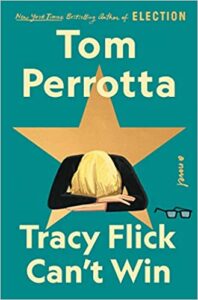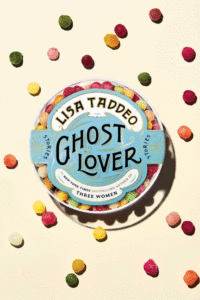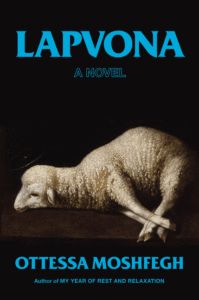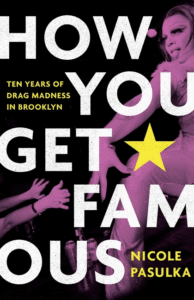
5 Book Reviews You Need to Read This Week
Featuring New Titles by Ottessa Moshfegh, James Patterson, Tom Perrotta, and More
This week’s feast of fabulous reviews includes Rob Doyle on Ottessa Moshfegh’s Lapvona, Katy Waldman on Tom Perrotta’s Tracy Flick Can’t Win, Johanna Thomas Corr on Lisa Taddeo’s Ghost Lover, Alexander Chee on Nicole Pasulka’s How You Get Famous, and Laura Miller on James Patterson’s James Patterson: The Stories of My Life.
Brought to you by Book Marks, Lit Hub’s “Rotten Tomatoes for books.”
*
“There’s something encouraging, and perhaps telling, about Ottessa Moshfegh’s success. Her abject, pervy, excremental fictions carry a whiff of deviance and nihilism into a squeaky clean mainstream that comforts some while alienating others … While our era’s ruling cultural-literary tone decrees ‘It’s the end of the world—no laughing,’ Moshfegh’s stuff is comically weird, amoral and antisocial … Lapvona’s grotesque, shameless world shows us not how it used to be, but how it’s always been … it soon becomes clear that this plot, like the medieval setting, is secondary to the pulsing, quivering tissue of incident and carnality that it facilitates … Particularly in her morally neutral scenes of physical and sexual humiliation, Moshfegh seems to write from a shady confraternity that includes the Marquis de Sade, Georges Bataille and Angela Carter … In the past, Moshfegh has trollishly floated the notion that she might be a bit of a hack (she revealed that her acclaimed novel Eileen issued from an awful-sounding ‘Write a novel in 90 days’ programme), but Lapvona confirms that such ploys served the author’s deeper agenda of getting the weird shit in front of a mass audience. What impresses here is not so much Moshfegh’s abilities with character or narrative, or even her language (which excels more in her short stories), as the qualities Lapvona shares with a Francis Bacon painting: depicting in blood-red vitality, without morals or judgment, the human animal in its native chaos.”
–Rob Doyle on Ottessa Moshfegh’s Lapvona (The Guardian)

“What does it mean to be special? What is the nature of success, of failure? Election was lightly interested in these topics, but Tracy Flick Can’t Win pores over them like an honors student before midterms … The election plot, dusted off and sent back to work, affords an opportunity to revisit not only Tracy but the earlier book’s suggestions about who deserves what … Perrotta’s sympathies often flow toward the margins of his fiction, where some of his most interesting characters dwell … What results is a somewhat cursory treatment of race—one that’s emblematic of the novel’s tasting-menu approach to hot-button topics … football’s concussion crisis and the political neglect of public education. These gestures, though, amount to little more than flickers on a radar screen, and a similar quality wilts Perrotta’s appraisal of élitism … This is a cogent deconstruction of the novel’s premise, but it exists at such a distance from the characters we care about, and whom we want to thrive on their own terms, that it feels merely cosmetic. The caveat duly registered, Perrotta retreats, immersing us back in the pleasures of his plot … That plot’s object is to redeem Tracy, and its climax is a feat of heroism that feels imported from a Marvel comic. Her exoneration thrilled me; I imagine that many readers will feel the same. But the effort of recuperation wears on the book. The aftertaste of a voguish feminism, one that casts all women as misunderstood saviors, lingers. Perrotta’s step seems surest when his characters’ saintliness—or, better yet, their miscreance—doesn’t lie quite so close to the surface … Perrotta wrings pathos from needs met and passed over, conducting a symphony of unruly yearnings, delusions, and dramatic ironies … Perrotta has retrieved and transvalued her, encouraged readers to root for her, and, finally, allowed her to win. If only he had allowed her to live.”
–Katy Waldman on Tom Perrotta’s Tracy Flick Can’t Win (The New Yorker)

“Viral success has emboldened [Taddeo] to abandon everything patient and methodical in her investigation of women’s darker appetites in favour of the literary equivalent of chasing clicks … Ghost Lover is a nine-course tasting menu that is all spice and no flavour … The main dish is always the same facile serving of female jealousy. In every effortfully flippant tale, self-conscious women compete to be the most desirable female in the room … At least the proper nouns denote actual things. When Taddeo attempts metaphor, we run into more serious trouble … Throughout, Taddeo rams words together in unexpected ways. ‘His voice turned throaty, filled with wetness and trees.’ Trees? … Perhaps Taddeo has read Lolita and feels excited about experimenting with the English language. Only it feels more as if she has done the experimenting in another tongue, Finnish or Swahili, perhaps, then run a series of untranslatable local sayings through Google Translate … In the course of producing this Goop noir, Taddeo has abandoned any interest in women as complex, conflicted humans. Her characters are myopically focused on blow-dries, blow jobs and brow tints … Inspires depression.”
–Johanna Thomas Corr on Lisa Taddeo’s Ghost Lover (The Times)
“Pasulka is a narrator and not a character here, and this distance gives her space to document the sweeping issues facing drag, like the significant generational and class divides … The resulting book is funny, poignant, dishy and even enlightening, all at the same time … For the queens Pasulka follows over the decade, celebrity is the key to everything from business success to social mobility to gender-affirming health care. As Pasulka outlines in her author’s note at the beginning of the book, the circumstances for queer people in the United States have generally improved over the years, but there is still no stable access to L.G.B.T.Q. civil rights in the country, especially in the current political climate where those rights are under attack in multiple states and potentially at risk from a conservative Supreme Court. Celebrity for drag performers is now a path to personhood and the status that might protect you when your government and family won’t. And so How You Get Famous isn’t just the story of a niche nightclub scene in Brooklyn—it’s the story of America now.”
–Alexander Chee on Nicole Pasulka’s How You Get Famous: Ten Years of Drag Madness in Brooklyn (The New York Times Book Review)
“’Man, do I have stories to tell,’ James Patterson writes in his new autobiography, James Patterson. The best-selling author does serve up stories, lots of them; the book is a grab bag of anecdotes, many of which have the tone and the import of a humorous icebreaker in a Rotary Club speech … As frustrating as James Patterson can be to read if you’d like to know more about how Patterson came to create his publishing empire, the book does generate some sympathy for its author. Patterson is keenly aware of the disdain heaped on his work, and he seems to feel every slight … But Patterson will have you know that he is not a philistine. A reluctant reader throughout his childhood, he fell in love with books while working the night shift as an aide at a psychiatric hospital; he recounts devouring the work of James Joyce and Gabriel García Márquez, but also writers offbeat enough (John Rechy, Evan S. Connell, Stanley Elkin) to ward off suspicions that he’s just dropping more names … It isn’t easy to defend yourself without coming across as defensive. Patterson is rich and famous, and things would be easier for him if he didn’t care what King or some literary critic says about him, but he clearly does, despite his efforts to hide it … Anyone curious to know how Patterson came to create his most celebrated character, what interested him in writing about the experience of Black Americans, and how he researched that experience will find no answers in James Patterson. (Anyone who wants to read about Patterson’s golf game, if such a person exists, will be well served) … In James Patterson, the stories—a cavalcade of mostly trivial tales, often told out of chronological order and sometimes having little to do with the author—come across as a screen he hides behind….this is perhaps the most forlorn aspect of James Patterson: that a man so relentlessly bullish on storytelling seems never to have formulated the story of his own life.”
–Laura Miller on James Patterson’s James Patterson: The Stories of My Life (The New Yorker)
Book Marks
Visit Book Marks, Lit Hub's home for book reviews, at https://bookmarks.reviews/ or on social media at @bookmarksreads.























